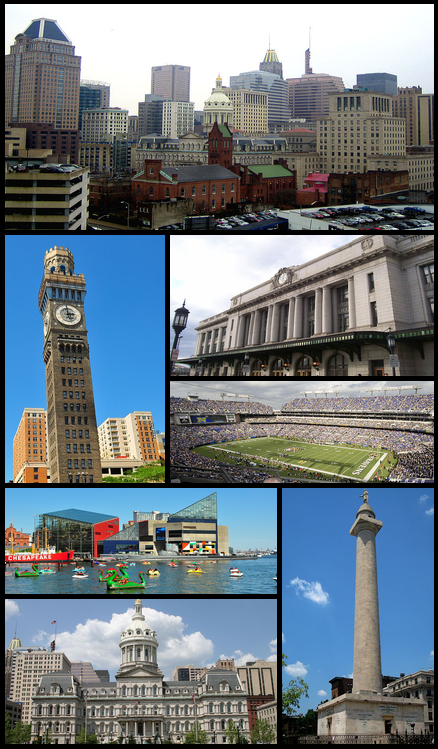Have you ever wondered how many people are crammed into Baltimore in Maryland? Here is the answer:
Baltimore, Maryland has a population density of 2609.39 inhabitants per square kilometer (6758.33 / sq mi)
That means the whole population of 622,104 people are living within an area of 238.41 sq km (92.05 sq mi).
As a reference: New York City has a population density of 6918 inhabitants per square kilometer (17918 / sq mi), thanks to it’s population of 8,398,748 inhabitants within an area of 1214 sq km (468.73 sq mi).

Baltimore ( BAWL-tim-or, locally: ) is the most populous city in the U.S. state of Maryland, as well as the 30th most populous city in the United States, with a population of 593,490 in 2019 and also the largest independent city in the country. Baltimore was established by the Constitution of Maryland as an independent city in 1851. As of 2017, the population of the Baltimore metropolitan area was estimated to be just under 2.802 million, making it the 21st largest metropolitan area in the country. Baltimore is located about 40 miles (64 km) northeast of Washington, D.C., making it a principal city in the Washington-Baltimore combined statistical area (CSA), the fourth-largest CSA in the nation, with a calculated 2018 population of 9,797,063.The city’s Inner Harbor was once the second leading port of entry for immigrants to the United States. In addition, Baltimore was a major manufacturing center. After a decline in major manufacturing, heavy industry, and restructuring of the rail industry, Baltimore has shifted to a service-oriented economy. Johns Hopkins Hospital (founded 1889) and Johns Hopkins University (founded 1876) are the city’s top two employers.With hundreds of identified districts, Baltimore has been dubbed a “city of neighborhoods.” Famous residents have included writers Edgar Allan Poe, Edith Hamilton, Frederick Douglass, W.E.B. Du Bois, Ogden Nash, Gertrude Stein, F. Scott Fitzgerald, Dashiell Hammett, Upton Sinclair, Tom Clancy, Ta-Nehisi Coates, and H. L. Mencken; musicians James “Eubie” Blake, Billie Holiday, Cab Calloway, Tori Amos, Frank Zappa, Tupac Shakur, Dan Deacon, Robbie Basho, Bill Frisell, Philip Glass, Cass Elliot, and Ric Ocasek ; actors and filmmakers John Waters, Barry Levinson, Divine, David Hasselhoff, Don Messick, John Kassir, Jada Pinkett Smith, and Mo’Nique; artist Jeff Koons; baseball player Babe Ruth; swimmer Michael Phelps; radio host Ira Glass; television host Mike Rowe; Supreme Court Justice Thurgood Marshall; Speaker of the United States House of Representatives Nancy Pelosi; and United States Secretary of Housing and Urban Development Ben Carson. During the War of 1812, Francis Scott Key wrote “The Star-Spangled Banner” in Baltimore after the bombardment of Fort McHenry. His poem was set to music and popularized as a song; in 1931 it was designated as the American national anthem.Baltimore has more public statues and monuments per capita than any other city in the country, and is home to some of the earliest National Register Historic Districts in the nation, including Fell’s Point, Federal Hill, and Mount Vernon. These were added to the National Register between 1969 and 1971, soon after historic preservation legislation was passed. Nearly one third of the city’s buildings (over 65,000) are designated as historic in the National Register, which is more than any other U.S. city.
Cities with a similar population density as Baltimore
Other cities that have a similar population density as Baltimore, Maryland are:
- Newburgh, New York with a population density of 2,281 people per sq km (5,912 / sq mi).
- Hallandale Beach, Florida with a population density of 3,093 people per sq km (8,016 / sq mi).
- Placentia, California with a population density of 2,944 people per sq km (7,622 / sq mi).
- Rochester, New York with a population density of 2,188 people per sq km (5,668 / sq mi).
- Buena Park, California with a population density of 2,949 people per sq km (7,633 / sq mi).
- Cypress, California with a population density of 2,787 people per sq km (7,221 / sq mi).
- Melrose, Massachusetts with a population density of 2,185 people per sq km (5,657 / sq mi).
- Margate, Florida with a population density of 2,264 people per sq km (5,862 / sq mi).
- San Bruno, California with a population density of 2,907 people per sq km (7,530 / sq mi).
- Covina, California with a population density of 2,621 people per sq km (6,789 / sq mi).
Cities with a similar population size as Baltimore
Here a list of cities that have a similar number of inhabitants like Baltimore, Maryland:
- Denver, Colorado with a population of 682,545 people
- Seattle, Washington with a population of 744,955 people
- Las Vegas, Nevada with a population of 648,224 people
- Milwaukee, Wisconsin with a population of 600,155 people
- Tucson, Arizona with a population of 520,116 people
- Oklahoma City, Oklahoma with a population of 591,967 people
- Charlotte, North Carolina with a population of 731,424 people
- El Paso, Texas with a population of 682,669 people
- Memphis, Tennessee with a population of 646,889 people
- Louisville, Kentucky with a population of 760,026 people
Cities with a similar size as Baltimore
If you want to check which cities have a similar size as Baltimore, Maryland, here you go:
- Dartmouth, Massachusetts with 252.60 square kilometers (252.60 sq mi), population: 34,032
- Palm Springs, California with 245.99 square kilometers (245.99 sq mi), population: 44,552
- Madison, Wisconsin with 243.83 square kilometers (243.83 sq mi), population: 236,901
- Oakland, California with 201.66 square kilometers (201.66 sq mi), population: 422,856
- Salt Lake City, Utah with 289.26 square kilometers (289.26 sq mi), population: 186,440
- Amarillo, Texas with 266.56 square kilometers (266.56 sq mi), population: 190,695
- Durham, North Carolina with 286.66 square kilometers (286.66 sq mi), population: 228,330
- Des Moines, Iowa with 234.99 square kilometers (234.99 sq mi), population: 203,433
- Duluth, Minnesota with 236.78 square kilometers (236.78 sq mi), population: 86,265
- Abilene, Texas with 290.33 square kilometers (290.33 sq mi), population: 117,063
